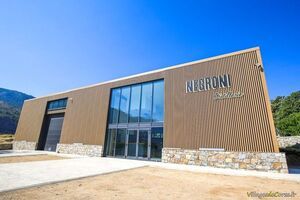
- Activities
- Gastronomy
- Liquorist
Corsican liqueurs and craft distilleries
What is a Corsican liqueur?
According to EU regulation 2019/787, a liqueur is a spirit drink containing >= 15% vol. and at least 100 g sugar /L (with some exceptions). Corsican liqueur makers respect this legal framework, while favoring :
- a neutral base of agricultural alcohol or local brandy,
- slow maceration (60 to 120 days) of berries, zest or maquis plants,
- cane sugar syrup added after extraction to balance aromatic strength,
- no artificial colors or flavors, to preserve the typicality of the terroir.
Historically, these recipes originated in rural families, who took advantage of seasonal harvests (myrtle in winter, citrus fruits at the beginning of the year, chestnuts in autumn) to "capture" the fragrances of the maquis and serve them as digestives at evening gatherings. Today, several artisanal distilleries perpetuate this tradition and are enjoying a growing popularity with tourists.
Emblematic flavors (myrtle, limoncellu, citrus...)
Myrte: maceration of berries (and sometimes leaves) picked on the coast; intensely fruity, ruby-red liqueur, ubiquitous in Corsican restaurants.
Limoncellu corse: an island variant of the Italian limoncello, made from untreated lemons ("citrone" and "ghjuvanninu" varieties) whose peel is macerated in alcohol before syrup is added. Its bright yellow color is reminiscent of Mediterranean light.
Other citrus fruits: mandarin (especially Casinca clementine) and citron make sweeter liqueurs, much appreciated at the end of a meal.
Liqueurs to (re)discover
- Chestnut: maceration of roasted chestnuts, sweet-woody flavor, 24-30% vol.
- River mint: wild aquatic variety, crystalline, refreshing liqueur.
- Blackberry: a fruity novelty (29% vol.) revealing the high hedges of Niolu.
Transportation (air, hold, cabin, customs)
In the cabin: liqueurs are liquids; each bottle must be <= 100 mL, placed in ONE transparent, resealable 1 L bag (approx. 20 × 20 cm). Bottles larger than this will be refused at security checkpoints.
In the hold: authorized if packaged for sale (sealed bottle). Regulatory limit for dangerous goods: total quantity of 5 L per passenger for beverages <= 70 % vol. Les spiritueux > 70% vol. are prohibited.
Customs duty-free (non-EU arrivals): 1 L of spirits > 22% or 2 L <= 22%, above: declaration and taxation. In the EU, quantities must remain "for personal use".
Tip: to offer a Corsican liqueur as a gift, opt for the 10 cL mini-bottle, which can be carried in the cabin and avoids the risk of breakage in the hold.